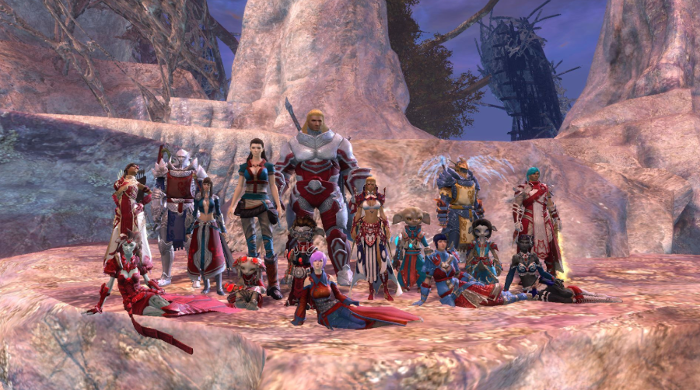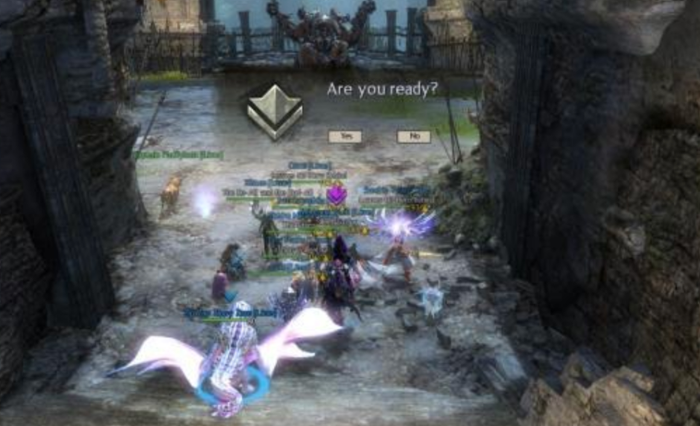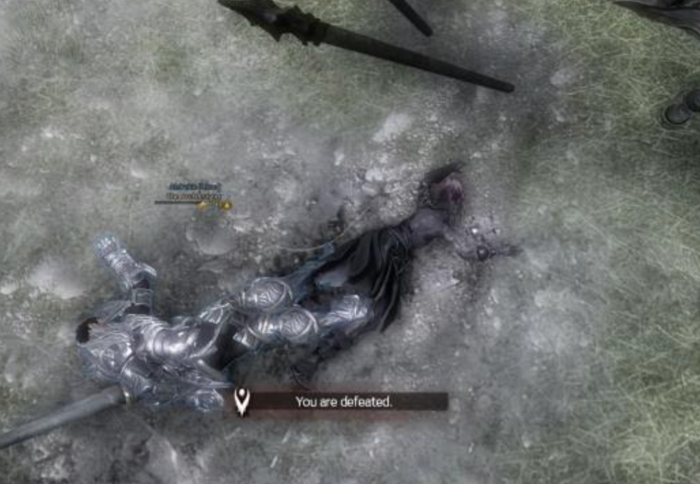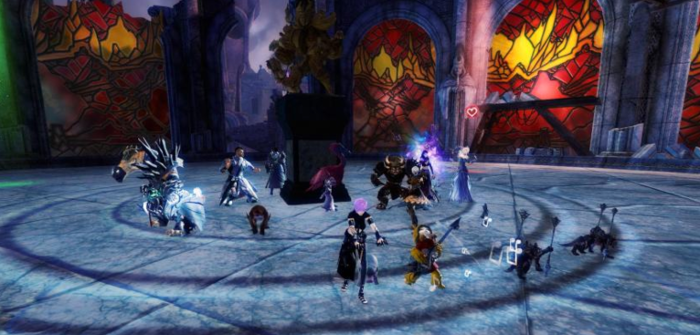For the better part of a decade, I have been leading guilds in massively multiplayer role-playing games (MMORPGs). Currently, I lead a guild in Guild Wars 2, and before that, I led progression raid teams in World of Warcraft, while also maintaining a career as a software engineer. As I made the transition into software development, it became clear that the skills I gained in building successful raid groups translated well to building successful tech teams.

Identify your problem
The first step to building a successful team, whether in software or MMORPGs, is to recognize your problem. In video games, it's obvious: the monster. If you don't take it down, it will take you down. In tech, it's a product or service you want to deliver to solve your users' problems. In both situations, this is a problem you are unlikely to solve by yourself. You need a team.
In MMORPGs, the goal is to create a "progression" raid team that improves over time for faster and smoother tackling of objectives together, allowing it to push its goals further and further. You will not reach the second objective in a raid without tackling the initial one first.
In this article, I'll share how you can build, improve, and maintain your own progression software and/or systems teams. I'll cover assembling our team, leading the team, optimizing for success, continuously improving, and keeping morale high.
Assemble your team
In MMORPGs, progression teams commonly have different levels of commitment, summed up into three tiers: hardcore, semi-hardcore, and casuals. These commitment levels translate to what players value in their raiding experience.
You may have heard of the concept of "cultural fit" vs "value fit." One of the most important things in assembling your team is making sure everyone aligns with your concrete values and goals. Creating teams based on cultural fit is problematic because culture is hard to define. Matching new recruits based on their culture will also result in homogenous groups.
Hardcore teams value dedication, mastery, and achievements. Semi-hardcore teams value efficiency, balance, and empathy. Casual teams balance fun above all else. If you put a casual player in a hardcore raid group, the casual player is probably going to tell the hardcore players they're taking things too seriously, while the hardcore players will tell the casual player they aren't taking things seriously enough (then remove them promptly).
Values-driven team building
A mismatch in values results in a negative experience for everyone. You need to build your team on a shared foundation of what is important, and each member should align with your team's values and goals. What is important to your team? What do you want your team's driving values to be? If you cannot easily answer those questions, take a moment right away and define them with your team.
The values you define should influence which new members you recruit. In building raid teams, each potential member should be assessed not only on their skills but also their values. One of my previous employers had a "value fit" interview that a person must pass after their skills assessment to be considered for hiring. It doesn't matter if you're a "ninja" or a "rockstar" if you don't align with the company's values.
When looking for new positions, I want a team that has a strong emphasis on delivering a quality product while understanding that work/life balance should be weighed more heavily on the life side ("life/work balance"). I steer away from companies with meager, two-week PTO policies, commitments over 40 hours, or rigid schedules. When interviews with companies show less emphasis on technical collaboration, I know there is a values mismatch.
Diversify your team
While values are important to share, the same skills, experience, and roles are not. Ten tanks might be able to get a boss down, eventually, but it is certainly more effective to have diversity. You need people who are skilled and trained in their specific roles to work together, with everyone focusing on what they do best.
In MMORPGs, there are always considerably more people who want to play damage roles because they get all the glory. However, you're not going to down the boss without at least a tank and a healer. The tank and the healer mitigate the damage so that the damage classes can do what they do. We need to be respectful of the roles we each play and realize we're much better when we work together. There shouldn't be developers vs. operators when working together helps us deliver more effectively.
Diversity in roles is important but so is diversity within roles. If you take 10 necromancers to a raid, you'll quickly find there are problems you can't solve with your current ability pool. You need to throw in some elementalists, thieves, and mesmers, too. It's the same with developers; if you everyone comes from the same background, abilities, and experience, you're going to face unnecessary challenges.
It's better to take the inexperienced person who is willing to learn than the experienced person unwilling to take criticism. If a developer doesn't have hundreds of open source commits, it doesn't necessarily mean they are less skilled. Everyone has to learn somewhere. Senior developers and operators don't appear out of nowhere. Teams often only look for "experienced" people, spending more time with less manpower than if they had just trained an inexperienced recruit.
Experience helps people pick things up faster, but no one starts out knowing exactly what to do, and you'd be surprised how seemingly unrelated skills translate well when applied to new experiences (like raid leadership!). Hire and support junior technologists. Keep in mind that a team comprised of a high percentage of inexperienced people will take considerably more time to achieve their objectives. It's important to find a good balance, weighed more heavily with experienced people available to mentor.Every member of a team comes with strengths we need to utilize. In raids, we become obsessed with the "meta," which is a build for a class that is dubbed most efficient. We become so obsessed with what is "the best" that we forget about what "just works." In reality, forcing someone to dramatically change their playstyle because someone else determined this other playstyle to be slightly better will not be as efficient as just letting a player play what they have expertise in.
We get so excited about the latest and greatest in tech that we don't always think about the toll it takes. It's OK to choose "boring" technology and adopt new technologies as they become standard. What's "the best" is always changing, so focus on what's best for your team. Sometimes the best is what people are the most comfortable with. Trust in your team's expertise rather than the tools.Take the lead
You need a strong leader to lead a team and guide the overall direction, working for the team. Servant leadership is the idea that we serve our entire team and their individual needs before our own, and it is the leadership philosophy I have found most successful. Growth should be promoted at the contributor level to encourage growth at the macro level. As leaders, we want to work with each individual to identify their strengths and weaknesses. We want to keep morale high and keep everyone excited and focused so that they can succeed.
Above all, a leader wants to keep the team working together. Sometimes this means resolving conflicts or holding meetings. Often this means breaking down communication barriers and improving team communication.

Communicate effectively
As companies move towards the remote/distributed model, optimizing communication and information access has become more critical than ever. How do you make sure everyone is on the same page?
During my World of Warcraft years, we used voice-over-IP software called Ventrilo. It was important for each team member to be able to hear my instructions, so whenever too many people started talking, someone would say "Clear Vent!" to silence the channel. You want the important information to be immediately accessible. In remote teams, this is usually achieved by a zero-noise "#announcements" channel in Slack where only need-to-know information is present.A central knowledge base is also crucial. Guild Wars 2 has a /wiki command built into the game, which brings up a player-maintained wiki in the browser to look up information as needed without bothering other players. In most companies where I've worked, information is stored across various repositories, wikis, and documents, making it difficult and time-consuming to seek a source of truth. A central, searchable wiki, like Guild Wars 2 has, would relieve this issue. Treat knowledge sharing as an important component of your company!
Optimize for what works
When you have your team assembled and are communicating effectively, you're prepared to take on your objectives. You need to think about it strategically, whether it's a monster or a system, breaking it down into steps and necessary roles. It's going to feel like you don't know what you're doing—but it's a starting point. The monster is going to die as long as you deplete its health pool, despite how messy the encounter may be at first. Your product can start making money with the minimum. Only once you have achieved the minimum can you move the goalpost.
Your team learns what works and how to improve when they have the freedom to experiment. Trying something and failing is OK if it's a learning experience. It can even help identify overlooked weaknesses in your systems or processes.

Deaths during the Samarog encounter.
Your team needs to feel comfortable making mistakes. The only true failures are when nothing can be salvaged and nothing was learned. For your team to feel comfortable experimenting, you need to foster a culture where people are held accountable but not punished for their mistakes. When your team fears retaliation, they will be hesitant to try something unfamiliar. Worse, they might hide the mistakes they've made, and you'll find out too late to recover.
Large-scale failures are rarely the result of one person. They are an accumulation of mistakes and oversights by different people combined with things largely outside the team's control. Tank healer went down? OK, another healer will cover. Someone is standing in a ring of fire. Your only remaining healer is overloaded, everything's on cooldown, and now your tank's block missed thanks to a random number generator outside her control. It's officially reached the point of failure, and the raid has wiped.
Is it the tank healer's fault we wiped? It went down first and caused some stress on the other healer, sure. But there were enough people alive to keep going. It was a cumulation of everything.
In systems, there are recovery protocols and hopefully automation around failures. Someone on-call will step in to provide coverage. Failures are more easily prevented when we become better aware of our systems.
Measure success (or failures) with metrics
How do you become more aware? Analysis of logs and metrics. Monitoring and observability.
Logs, metrics, and analysis are as important in raids as they are around your systems and applications. After objectives, we review damage output, support uptime, time to completion, and failed mechanics.
Your teams need to collect similar metrics. You need baseline metrics to compare and ensure progress has been made. In systems and applications, you care about speed, health, and overall output, too. Without being able to see these logs and metrics, you have limited measures of success.

Boon uptime stats for my healer, Lullaby of Thix.
Continuously improve
A team is a sum of its parts, with an ultimate goal of being coordinated at both the individual and group levels. You want people comfortable in their roles and who can make decisions in the best interest of the whole team; people who know how to step in when needed and seamlessly return to their original role after recovery. This is not easy, and many teams never reach this level of systemization.
One of the ways we can improve coordination is to help people grow where they are struggling, whether by extending additional educational resources or working with them directly to strengthen their skills. Simply telling someone to "get good" (a phrase rampant in gaming culture) is not going to help. Constructive feedback with working points and pairing will, though.
Keep in mind that you're measuring progress properly. You can't compare a healer's damage output to that of a dedicated damage class. Recognize that just because someone's performance looks different than another's, it could be that they are taking on roles that others are neglecting, like reviewing code or harder-than-average tickets.
If one person isn't carrying their weight and the team notices, you have to address it. Start positively, give them a chance to improve: resources, assistance, or whatever they need (within reason). If they still show no interest in improvement, it's time to let them go to keep your team happy and running smoothly.
Maintain happiness
Happiness is important for team longevity. After the honeymoon phase is over, what makes them stay?
Safety
One of the core, foundational needs of maintaining happiness is maintaining safety. People stay where they feel safe.
In a game, it's easy to hide your identity and try to blend in with the perceived status quo. When people are accepted for who they are, they are comfortable enough to stay. And because they stay, a diverse community is built.One way to create this sense of safety is to use a Code of Conduct (CoC) that, as explicitly as possible, maps out boundaries and the consequences of violating them. It serves as a definitive guide to acceptable behavior and lets people have minimal doubts as to what is and is not allowed. While having a CoC is a good start, it is meaningless if it is not actively enforced.
I've had to cite CoC violations to remove gaming members from our community a few times. Thankfully this doesn't happen very often, because we review our values and CoC as part of the interview process. I have turned people away because they weren't sure they could commit to it. Your values and CoC serve as a filter in your recruiting process, preventing some potential conflicts.
Inclusion
Once people feel safe, they want to feel included and a sense of belonging. In raids, people who are constantly considered substitutes are going to find a different team where they are appreciated. If hero worship is rampant in your team's culture, you will have a difficult time fostering inclusion. No one likes feeling like they are constantly in the shadows. Everyone has something to bring to the table when given the chance.
Reputation management
Maintaining team happiness also means maintaining the team's reputation. Having toxic members representing you damages your reputation.
In Guild Wars 2, a few members belonging to the same guild wanted the achievements and rewards that come from winning a player vs. player (PvP) tournament, so they purchased a tournament win—essentially, skilled PvP players played as them and won the tournament. ArenaNet, the maker of Guild Wars 2, found out and reprimanded them. The greater community found out and lost respect for the entire guild, despite only a tiny percent of the guild being the offenders. You don't want people to lose faith in your team because of bad actors.
Having a positive impact on the greater community also carries a positive impact on your image. In games, we do this by hosting events, helping newcomers, and just being friendly in our interactions with people outside our guilds. In business, maybe you do this by sponsoring things you agree with or open sourcing your core software products.If you have a good reputation, earned by both how you treat your members and how you treat your community, recruiting new talent and retaining the talent you have will be much easier.
Recruiting and retraining take significantly more effort than letting people just relax from time to time. If your team members burn out, they are going to leave. When you're constantly retraining new people, you have more and more opportunities for mistakes. New people to your team generally lack knowledge about the deep internals of your system or product. High turnover leads to high failure.
Avoid burnout
Burnout happens in gaming, too. Everyone needs a break. Time off is good for everyone! You need to balance your team's goals and health. While we may feel like cogs in a machine, we are not machines. Sprint after sprint is really just a full-speed marathon.
Celebrate wins
Relieve some pressure by celebrating your team's success. This stuff is hard! Recognize and reward your teams. Were you working on a monster encounter for weeks and finally got it down? Have a /dance party! Finally tackled a bug that plagued you for months? Send everyone a cupcake!

A dance party after a successful Keep Construct encounter in Guild Wars 2.
Always evolve
To thrive as a team, you need to evolve with your market, your company, and your community. Change is inevitable. Embrace it. Grow. I truly believe that the worst thing you can say is, "We've always done it this way, and we're not going to change."
Building, maintaining, and growing a heroic team is an arduous process that needs constant evolution, but the benefits are infinite.
Aly Fulton will present It's Dangerous to Go Alone: Leveling Up a Heroic Team at LISA18, October 29-31 in Nashville, Tenn.






Comments are closed.